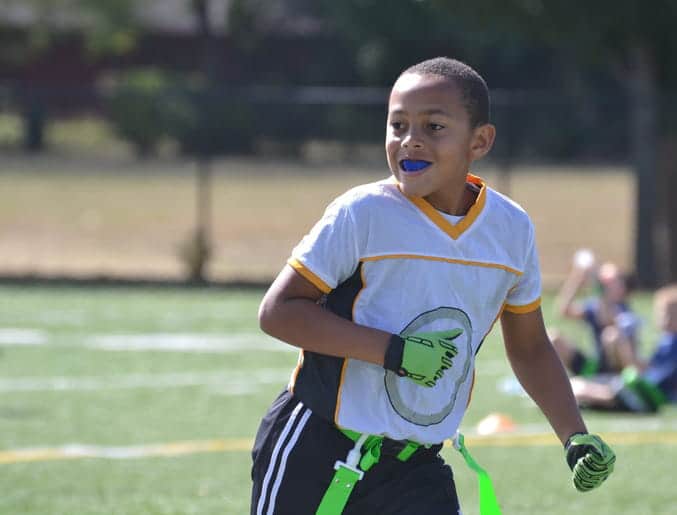Getting involved in sports is an excellent way for your kids to stay active and have fun with friends. However, contact sports do come with some risks to their dental health. If you’re concerned about dental risks in sports, there are ways to protect your child’s teeth and prevent serious dental injuries.
Common Types Of Dental Injuries In Sports
Dental risks in sports can lead to different types of injuries. While protective gear does help, some instances of dental trauma are hard to avoid. These are the most common types of dental injuries in contact sports:
- Soft tissue injuries: Injuries to the gums or inside of the mouth
- Tooth fracture: A cracked or broken tooth
- Tooth avulsion: A tooth is knocked out of its socket
- Tooth subluxation: An injury to the gum tissue that causes a loose tooth
- Tooth intrusion: The tooth is pushed into its socket
- Orofacial trauma: Injuries to the jaw and surrounding bone
Most of these injuries are considered dental emergencies and require immediate attention to repair the damage and prevent the condition from worsening. If your child experiences a Las Vegas dental emergency, contact Absolute Dental right away for urgent treatment with a pediatric dentist.
Sports With The Highest Risk Of Dental Injuries
Contact sports are inherently risky because of the physicality involved. According to data shared by the National Library of Medicine, these are the sports that have the highest risk of dental trauma:
- Basketball
- Football
- Hockey
- Martial arts
- Boxing
How To Prevent Dental Injuries In Sports
If your child participates in competitive sports, you can work with your dentist and your child’s coaches to lower the risk of dental injuries. Here are some tips to prevent dental trauma in youth sports.
1. Use A Protective Mouthguard
The American Academy of Pediatric Dentistry (AAPD) details how crucial protective mouthguards are to preventing dental injuries in youth sports. Even if there is no official requirement for mouthguards, you can speak with a general dentist about protective gear options for your child’s mouth, including:
- Custom-fitted mouthguards: A dentist takes a mold of your child’s mouth for a personalized fit over the teeth and at least one arch. These are available through a dental professional.
- Mouth-formed mouthguards: These mouthguards are first submerged in hot water to become malleable before being inserted into the mouth. You must bite down to create the fit you want. These “boil-and-bite” mouthguards are typically sold in sporting goods stores and some pharmacies.
- Stock mouthguards: One-size-fits-all mouthguards are also available in many stores and are an alternative to more customized options. They may be a good choice for kids with braces whose teeth are shifting and changing during treatment.
According to the AAPD, custom-fitted mouthguards provide superior protection, retention, and comfort. However, mouth-formed and stock mouthguards are also available and offer protective benefits as well.
2. Wear A Helmet
For some sports, helmets are mandatory to protect an athlete’s head and face from injuries. They provide cushioning and a barrier to shield your child’s mouth while playing contact sports like football and hockey. Talk to your child about the importance of wearing a helmet the right way.
3. Compete At The Appropriate Level
While children are growing and developing, their physical strengths and abilities can vary greatly from one year to the next. Take this into account when enrolling your child in recreational sports teams. You’ll want to find a group appropriate for your child’s age level, size, and ability to reduce dental risks in sports.
4. Get Regular Dental Check-Ups
If you want to keep your child’s smile healthy and strong, regular dental appointments with your pediatric dentist are a must. However, they can also help to prevent dental injuries. During a routine exam, your dentist may notice a dental issue or condition that may make your child more prone to a serious injury. Addressing these problems and treating them before participating in sports is best.
5. Encourage Coaches To Prioritize Safety Gear
As a parent or guardian, you can talk to your child’s coach about safety gear, including mouthguards. Work together to educate yourselves and the kids about safety gear, how it works, and why it’s important. If the coach is serious about the kids wearing their mouthguards and helmets, the more likely your child will follow the rules.
6. Have A Dental Emergency Plan In Place
It’s also a good idea to have a plan in place if a dental injury does occur. Make sure dental first aid kits are readily available during sporting events and competitions. Also, find an experienced emergency dentist in your area where you can take your child for immediate treatment. Quick action can reduce the injury’s severity and impact on your child’s dental health.
Pediatric Sports Dentistry Services At Absolute Dental
Working with a trusted pediatric dentist is the best way to stay on top of your child’s oral health and protect their permanent teeth. In addition to routine dental care, your dentist can offer recommendations on preventing dental injuries in sports.
With offices throughout Las Vegas, Reno, and other parts of Nevada, Absolute Dental’s pediatric professionals can help kids keep their smiles healthy and bright. Contact us to learn more about our pediatric services and special discounts for cash-paying patients.
Sources:
Advances in Youth Football Helmets.
Oral First Aid At Home. (2023).
Policy on Prevention of Sports-Related Orofacial Injuries. (2023).
Young, E., et al. (2015). Common Dental Injury Management in Athletes.
